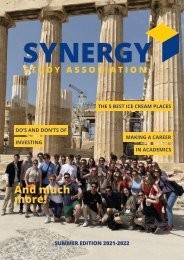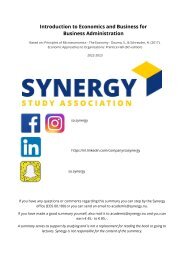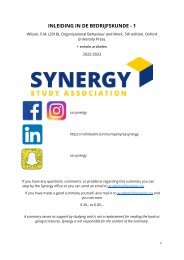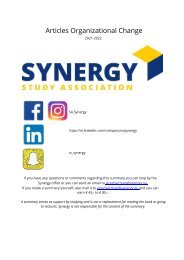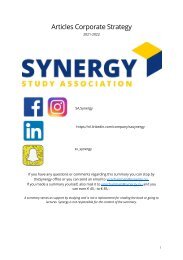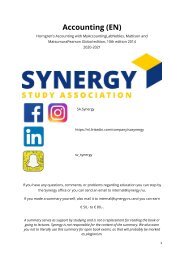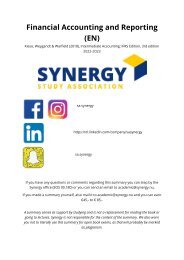Leadership in Organizations
Create successful ePaper yourself
Turn your PDF publications into a flip-book with our unique Google optimized e-Paper software.
o<br />
Oversimplifies the situation, by try<strong>in</strong>g to answer to a complex and<br />
dynamic situation<br />
Chapter 5 Situational and cont<strong>in</strong>gent leadership<br />
To succeed, a leader needs to adapt their behaviour to take knot account the demands<br />
of the situation they face because effective leadership is dependent upon circumstance<br />
and situation.<br />
Anyone can lead as long as they use the correct approach, <strong>in</strong>ferr<strong>in</strong>g that leadership can<br />
be taught and learnt.<br />
For the first time, the view on organizations and management changed à now they th<strong>in</strong>k<br />
organizational form and its associated management and leadership were shaped by<br />
external forces.<br />
<strong>Leadership</strong> style is dependent (cont<strong>in</strong>gent) on situational factors outside the control of<br />
the manager.<br />
Redd<strong>in</strong> (1967) suggested that a different approach is needed <strong>in</strong> different organizations.<br />
He created a three-dimensional model, divided <strong>in</strong> four ‘less effective types’, four ‘latent<br />
types’ and four ‘more effective types’.<br />
Redd<strong>in</strong>’s twelve 3-D styles<br />
No orientation<br />
Relationship<br />
orientation<br />
Task<br />
orientation<br />
Task and<br />
relationship<br />
orientation<br />
Latent Separated Relations Task Integrated<br />
Ineffective Deserter Missionary Autocrat Compromiser<br />
Effective Bureaucrat Developer Benevolent<br />
autocrat<br />
Executive<br />
Four basic (latent) types<br />
1. Separated: ma<strong>in</strong>ta<strong>in</strong><strong>in</strong>g the system and status quo. Largely removed from both<br />
people and tasks.<br />
2. Relations: friendly, open person who is concerned about a pleasant<br />
environment. Communication mostly about personal matters, little focus on<br />
driv<strong>in</strong>g bus<strong>in</strong>ess forward.<br />
3. Task: wants to get the job done. Individual goals more important than the<br />
broader agenda.<br />
4. Integrated: supports teamwork, prefers a shared set of objectives.<br />
Four ‘less effective’ types<br />
5. Deserter (low task/low relationship): might destroy the morale and performance<br />
of his subord<strong>in</strong>ates.<br />
12







